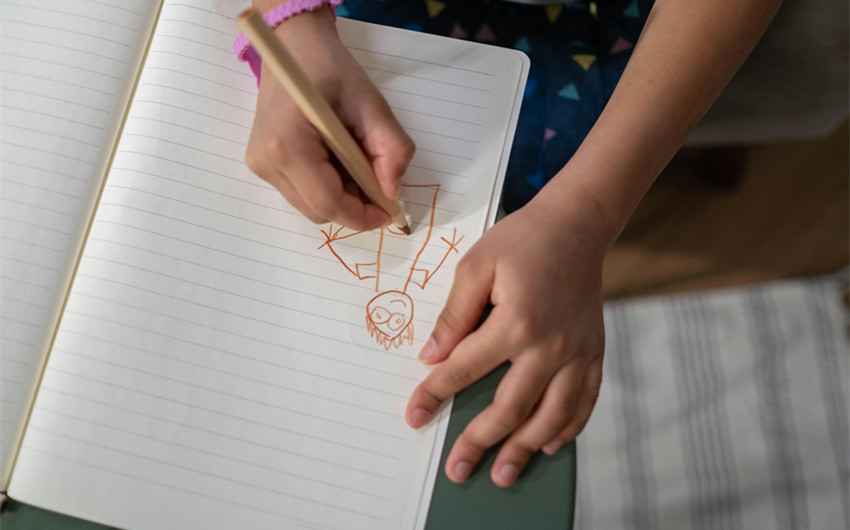40 Clever Ideas for What to Do When Bored in Class
We’ve all been there—staring at the clock, struggling to stay awake while the lesson seems to stretch on forever. Whether it’s a topic you’ve already mastered or just a slow day, boredom in class can sneak up fast. If you’re sitting at your desk wondering what to do when bored in class, you’re not alone.
The good news? There are plenty of quiet, creative, and even productive ways to pass the time without getting into trouble. This list has your back with fun ideas to keep your brain busy (and maybe even help you learn a little more, too).
Discreet Things to Do That Look Productive

When you’re bored in class but still want to appear engaged, discreet activities are your best friend. These are quiet, subtle things you can do that help you stay awake and mentally active—without drawing unwanted attention. From organizing your notes to writing neatly in your planner, these tasks look like you’re being responsible (and in some cases, you actually are!). It’s a smart way to make the most of class time without zoning out or getting into trouble.
1. Doodle in the margins of your notes
Draw small shapes, patterns, or characters around your class notes to stay occupied without causing a distraction. It looks like you’re just adding emphasis or underlining.
2. Rewrite class notes in neater handwriting
Use your downtime to recopy messy notes into a cleaner, more organized format. It helps reinforce what you’ve learned and keeps your notebook looking great.
3. Create a color-coded homework or study schedule
Design a weekly planner using different colors for each subject or task. It keeps you organized and looks like you’re actively working.
4. Organize your binder or folders
Sort through loose papers and put everything in its proper place. Toss out what you don’t need and create labeled sections for each subject.
5. Make a to-do list for after school
Jot down things you need to do later—homework, chores, or fun plans. It keeps your mind active and gives you something to look forward to.
6. Highlight key terms from today’s lesson
If you have a highlighter handy, go back through your notes and emphasize vocabulary or main ideas. It shows you’re reviewing, even if you’re bored.
7. Practice handwriting styles or calligraphy
Try writing the alphabet in cursive, bubble letters, or fancy fonts. You’re still writing, and it’s a fun way to develop a unique handwriting style.
8. Flip through your textbook and read random facts
Open to a random page and see what catches your eye. You might learn something unexpected—and it looks like you’re diving deeper into the material.
Brain-Boosting Activities

Boredom doesn’t mean your brain has to go to sleep. This category is all about giving your mind a workout with fun, educational mini-challenges. Think word games, memory tests, logic puzzles, or trivia recall—little things you can do quietly that keep your brain busy and sharp. These activities are especially great if you want to stay alert without disrupting the flow of class or needing any supplies.
1. Solve a Sudoku or number puzzle
Keep a small puzzle book in your bag or solve one mentally. It exercises logic and focus while staying quiet and low-key.
2. Try to recite the alphabet backward
Challenge your brain with this weirdly tricky task. It’s harmless, silent, and keeps your mind engaged in a fun way.
3. Invent your own quiz questions about the current topic
Create mini-quiz questions in your notebook. Try answering them yourself, or quiz a friend later to help both of you review.
4. Count how many words in the room you can find starting with the same letter
Pick a letter and scan your surroundings—whiteboard, posters, books—for matching words. It’s like a visual scavenger hunt for your brain.
5. Memorize state capitals or country flags in your head
Pick a country or state and test your memory. Try to name all the capitals or visualize the flags—perfect for trivia buffs.
6. Do quick mental math using classmates’ birthdays
Use birthdays or numbers around the room to create math problems in your head. It’s sneaky math practice disguised as boredom relief.
7. Create a list of words that rhyme with a random word
Pick a word and list as many rhymes as you can. It helps with creativity, vocabulary, and keeps you mentally active.
8. Rearrange the letters of your name to make funny anagrams
Turn your name into goofy phrases or character names by rearranging the letters. It’s brainy and silly at the same time.
Quiet Creative Outlets

Sometimes the best way to beat boredom is to let your imagination run wild. This category offers low-key, creative activities you can do with just a notebook and pen. Drawing, writing, and dreaming up stories are perfect outlets for quiet expression—and they help you pass the time in a way that’s calming, fun, and sometimes even inspiring. Just be sure to keep things subtle so your creativity doesn’t become a distraction.
1. Write a short poem about something in the classroom
Whether it’s a funny haiku about your pencil or a dramatic ode to the clock, poetry is a great way to express your boredom creatively.
2. Sketch your teacher as a cartoon character
Turn your teacher into a superhero, wizard, or alien—just keep it respectful! It’s a fun challenge for your imagination.
3. Design a dream house or fantasy castle
Draw a layout or blueprint of your ideal home. Include secret rooms, slides instead of stairs, or anything else your imagination allows.
4. Invent a new animal by combining two existing ones
Mash together a giraffe and a jellyfish. What would it eat? What would it be called? Draw it and describe it!
5. Write a fake news headline about your school
Get silly and write something like “Math Teacher Caught Flying During Quiz!” It’s just for laughs, and you might even create a few more.
6. Draw a mini comic strip in your notebook
Come up with a funny or random short comic—maybe starring your eraser or a superhero stapler. Great for quick bursts of creativity.
7. Create a bucket list of things you want to try
Think of things big or small: travel destinations, hobbies to try, or foods to taste. It’s inspiring and fun to dream a little.
8. Draft the first sentence of a made-up novel
Start with a powerful or strange line like “It was raining glitter when I saw the spaceship.” Where would the story go?
Social (but Subtle) Fun

If you’re feeling playful and you’re sitting near a friend, there are plenty of ways to entertain yourselves without getting caught. This section is full of silly, whisper-friendly games and shared jokes that bring a little joy to a boring class. The key here is being respectful—these ideas are meant to be lighthearted and quiet, not disruptive. When done right, they can turn a dull hour into a fun, secret memory between friends.
1. Pass a folded note with silly questions to a friend
Stick to lighthearted or random questions like “What would you name a pet raccoon?” Just keep it subtle and respectful of the teacher’s focus.
2. Play tic-tac-toe or hangman on paper
Classic, quiet, and quick. Use a notebook or scrap paper and keep the rounds fast so you don’t get caught.
3. Invent a hand signal for every vowel and try using it
Secret communication system with a friend? Yes, please. Just keep it low-key and don’t distract others.
4. Make up secret nicknames for classmates (just for fun!)
Think of playful, not mean, nicknames based on quirks or habits. It’s a harmless way to giggle quietly with a friend.
5. Silently mouth lyrics to a song and see if a friend can guess it
Like silent karaoke! It’s a fun guessing game—just don’t sing out loud and attract attention.
6. Try to copy your friend’s handwriting exactly
Get your spy on and see if you can match someone’s handwriting. It’s weirdly satisfying and a cool skill.
7. Create a fake spy mission and share coded clues
Write a “mission briefing” and pass it secretly to a friend. Use codes, riddles, or fake map sketches.
8. Challenge a seatmate to “count the blinks” without laughing
Stare at each other and try to count every blink or hold a staring contest. It’s harder than it sounds—and super funny if you can stay quiet.
Mindfulness and Daydreaming

Bored moments can also be an opportunity to slow down and reconnect with yourself. This category offers calming, introspective activities that help you reflect, relax, or reset mentally. Whether it’s breathing exercises, visualizations, or thoughtful daydreaming, these ideas help you pass the time in a peaceful way—and they can actually boost your mood or focus when class picks up again.
1. Visualize a peaceful beach or forest scene
Close your eyes briefly or just zone out while imagining every detail of a calming place. It’s a quiet way to reset your brain.
2. Breathe in for 4 counts, hold for 4, out for 4
Use the “box breathing” method to calm your nerves and refocus. It’s subtle and effective during long, dragging lessons.
3. Mentally list five things you’re grateful for
Boredom can be a chance for reflection. Think about the people, moments, or comforts in your life you appreciate.
4. Daydream about your future dream job
Imagine what your ideal day at work would look like—what you’d wear, where you’d go, who you’d meet.
5. Picture the perfect weekend from start to finish
Build an imaginary weekend full of your favorite activities—from sleeping in to your dream snack lineup.
6. Watch the shadows or lights in the room and follow their patterns
Trace how light hits the desk or the movement of shadows. It’s a quiet observational activity that gently grounds you.
7. Try to remember your happiest memory in detail
Relive a favorite moment—who was there, what you saw, how you felt. It’s a comforting exercise and a happiness boost.
8. Create a mental playlist of your favorite songs
Think through your favorite songs in order, even sing them in your head. It’s a great way to pass time and lift your mood.
Things You Probably Shouldn’t Do
While it’s tempting to push the limits when you’re bored, some actions are best avoided. This section outlines behaviors that can disrupt others, get you in trouble, or hurt your own learning. It’s not about being strict—it’s about helping you dodge those “why did I do that?” moments. Knowing what not to do is just as useful as knowing what you can do.
1. Loudly tapping your pen or drumming on your desk
Even if you’re not trying to annoy anyone, repetitive noises can distract others and get you in trouble fast.
2. Falling asleep during a lecture
It may be tempting, but it looks disrespectful and could cause you to miss important info—or get called out.
3. Texting or scrolling through social media
Not only is it against most classroom rules, but it pulls your attention away entirely and could result in losing your phone.
4. Whispering or chatting constantly with a friend
Even low-volume conversations can be disruptive and catch the teacher’s attention. Save it for after class.
5. Throwing paper or small objects
Seems funny in the moment, but it’s disruptive and could easily escalate into a bigger problem—or hit someone accidentally.
6. Making faces or trying to make others laugh
It’s tempting to be the class clown when you’re bored, but it can quickly cross the line and disrupt everyone else.
7. Drawing inappropriate things in your notebook
Not only is it immature, but if someone sees it (especially a teacher), it could lead to disciplinary action.
8. Sneaking earbuds in to watch videos or play games
It’s a bold move, but super risky. You’ll be off-task and likely caught, which isn’t worth it.







